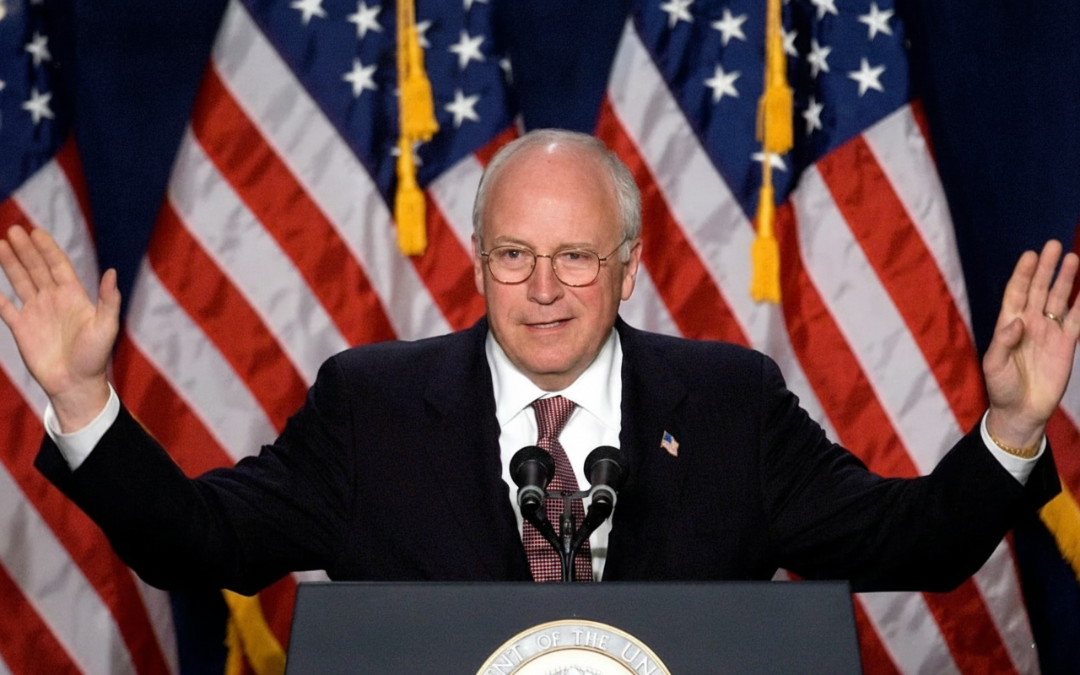Washington, D.C. – Former U.S. Vice President Dick Cheney, one of the most influential and controversial figures in American politics, passed away Monday evening at the age of 84. His family reported that Cheney died of complications from pneumonia and heart disease, surrounded by his wife Lynne and daughters Mary and Liz.
“Dick Cheney was an extraordinary man who taught his children to love their country, live courageously, and act with honor and responsibility,” the family said in a statement. “We are grateful beyond measure for all he did for our nation and blessed to have loved him.”

From Nebraska to the Halls of Power
Born Richard Bruce Cheney on January 30, 1941, in Lincoln, Nebraska, Cheney grew up in a middle-class family. His father worked in soil conservation, and his mother valued education deeply. The family moved to Casper, Wyoming, when Cheney was 13. There, he excelled in sports and student leadership, setting the stage for his future political ambitions.
Cheney’s political career began in college, initially at Yale before returning to Wyoming due to academic struggles. He earned a bachelor’s and master’s degree in political science from the University of Wyoming. Early internships on Capitol Hill allowed him to build connections, and under Presidents Nixon and Ford, he rose quickly. By 34, he became the youngest White House Chief of Staff and later served as Secretary of Defense under George H.W. Bush.
September 11 and the War on Terror
On September 11, 2001, Cheney played a central role in the emergency response as terrorists attacked the United States. He directed congressional leaders to safety and oversaw operations from the Presidential Emergency Operations Center. In his memoirs, he reflected, “We entered a new era, where war was no longer just between nations, but against terrorists operating in the shadows.”
Cheney also became a chief architect of the Bush administration’s policies, expanding executive power, overseeing counterterrorism measures, and planning military operations in Afghanistan and Iraq. His decisive approach earned praise for its clarity, though it also sparked criticism over concentrated authority and domestic surveillance measures.
Achievements and Controversies
Cheney wielded unprecedented influence for a vice president. He shaped energy policy, national defense, and intelligence strategy. Yet, his tenure was marked by controversy: the 2006 hunting accident in Texas, Halliburton contracts in Iraq, and post-9/11 interrogation programs.
The Iraq War, in particular, polarized public opinion. Thousands of U.S. troops and over 100,000 Iraqis died, with expenditures exceeding $800 billion. Cheney defended the invasion as necessary to remove Saddam Hussein and safeguard U.S. security.
Family Life and Health Struggles
Cheney’s family life was central to his identity. Married to Lynne for 61 years, he raised two politically active daughters while pursuing his passion for fly-fishing.
Health challenges were a constant concern. Cheney suffered five heart attacks, underwent multiple bypass surgeries, and received a left ventricular assist device (LVAD) in 2010. In 2012, he underwent a heart transplant, prolonging his life for several more years.

Legacy and Influence
Cheney leaves behind a complex legacy. Admired by some as the most powerful vice president in history, he was also criticized for controversial decisions regarding war, executive authority, and counterterrorism programs. Former President George W. Bush said, “Dick played a pivotal role in every major decision, from national security to cabinet appointments.”
Yet human rights organizations and public figures questioned the consequences of policies Cheney championed, particularly the use of enhanced interrogation techniques.
A Life That Shaped History
Dick Cheney died at 84, leaving a career defined by power, controversy, and lasting impact. His life illustrates how leadership in critical moments can shape history, but also carries enduring consequences.
He reminded Americans of the importance of courage, responsibility, and vigilance in public service. Cheney will be remembered as a figure whose influence was undeniable, a vice president whose decisions sparked debate, and a man whose life story continues to provoke discussion about power, ethics, and national security.
Dick Cheney, 1941‑2025: a life devoted to America, a legacy that will be debated for generations.